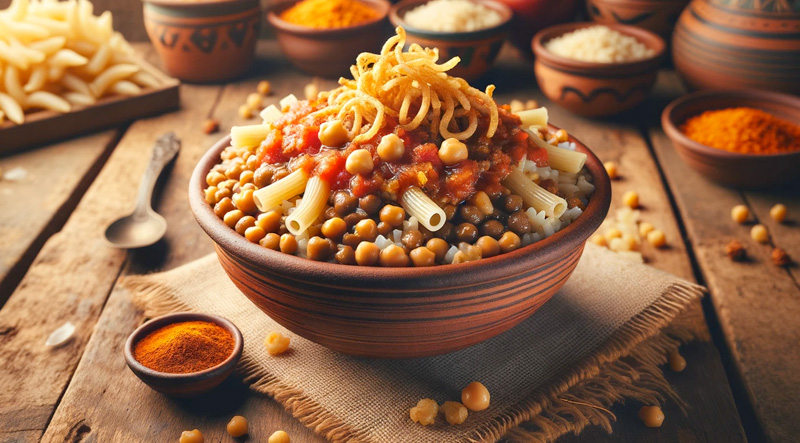Koshari is a vegetarian dish and is appreciated for its affordability and fulfilling nature. It is a staple of Egyptian cuisine and reflects the country's culinary traditions and the influence of various cultures. The dish combines elements from Italian (pasta), Indian (rice and lentils), and Middle Eastern (chickpeas, spices) cuisines, showcasing Egypt's historical connections and cultural exchanges. Koshari is not only a delicious meal but also a symbol of Egypt's diverse and rich culinary landscape. Read More...
Cook the Lentils, Rice & Macaroni:
Prepare the Tomato Sauce:
Assemble the Koshari:

Serve:
Tips
Enjoy your homemade Koshari, a dish that’s not just a treat for the palate but also an embodiment of Egyptian culinary heritage!
Preparing and cooking Koshari takes approximately 1 to 1.5 hours. The process begins with cooking the lentils, which takes about 20-25 minutes. Simultaneously, the rice and macaroni can be cooked in separate pots, each requiring about 18-20 minutes. While these components are cooking, the tomato sauce can be prepared, which takes around 10 minutes. The most time-consuming part is often frying the onions until they are crispy, which can take an additional 10-15 minutes. Assembling the dish is relatively quick, involving mixing the rice, lentils, and macaroni, and then adding the chickpeas and fried onions on top. The total time can vary based on whether these components are prepared sequentially or concurrently. Koshari is a layered dish, and its preparation involves managing several components, each contributing to the overall cooking time.
A single serving of Koshari is relatively high in calories, typically ranging between 400 to 500 calories. This calorie count can vary depending on the proportions of the ingredients used. The dish's main components, rice, lentils, and macaroni, are rich in carbohydrates, which constitute the bulk of its caloric content. Additionally, the fried onions, which are an essential topping, add more calories due to the oil used for frying. The tomato sauce, although not very caloric on its own, can contribute to the overall calorie count if prepared with oil or additional sugar. Despite being calorie-dense, Koshari is also nutritious, providing a good balance of carbohydrates, protein (from the lentils and chickpeas), and fiber.







